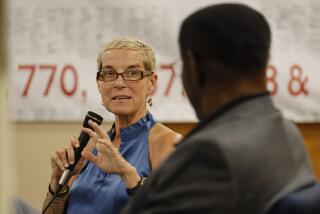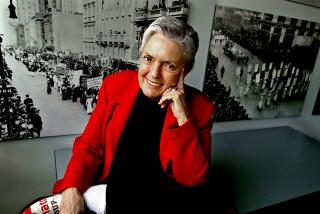A-J Levinson, 73; Helped Pioneer Living Wills and Patient Rights
- Share via
A-J Levinson, who led a New York-based patients’ rights group that developed the now-common living will and served as a national spokeswoman for bringing dignity to dying, has died. She was 73.
Levinson died of cancer Monday at her home in Manhattan.
As executive director of Concern for Dying from 1976 to 1987, Levinson urged family members, doctors, nurses and other caregivers to honor a dying person’s wishes.
The now-defunct Concern for Dying, which grew out of the Euthanasia Educational Council, was founded in 1967. Levinson, who had been on the board, became executive director the same year that the New Jersey Supreme Court ruled in the nation’s first major right-to-die case that the parents of Karen Ann Quinlan had the right to remove her from life support. Their daughter was 21 when she slipped into a coma at a party in 1975.
The Quinlan case propelled bioethics into the American consciousness.
Concern for Dying distributed more than 7 million copies of the living will, a document that individuals sign while competent to express their wishes not to have their lives prolonged through the use of artificial or heroic means if there is no hope of recovery.
“The important point,” Levinson told television newsman Robert MacNeil in 1985, “is that it is most helpful to family members as well as physicians if they have a clear indication of what the patients would have wanted. Because the decision has to be made, or should be made, rightfully, on the basis of that patient’s feelings and directions.”
Levinson and her organization also stressed the need for dying patients to have sufficient pain medication. Levinson, however, denounced mercy killing.
There are, she told The Times in 1986, moral and practical reasons to oppose a law allowing mercy killing. Such a law, she said, would have enormous potential for abuse and the category of those eligible for euthanasia inevitably would grow to include questionable cases.
“I don’t think society should be in the business of killing people,” she said. “If society were to do a better job of treating pain and treating the suffering of terminal illness, we wouldn’t have patients saying, ‘Kill me.’”
Born Ann Jane Rock in Boston in 1929, Levinson (she preferred to go by the hyphenated A-J) was the daughter of a mother who drove an ambulance during World War I and a father, Dr. John Rock, who taught at Harvard Medical School and helped develop the first birth control pill.
After graduating from Bryn Mawr with a degree in history, she worked briefly for the Central Intelligence Agency. She did graduate work in psychology and sociology at Columbia in 1957 and later taught in private schools in Manhattan, where she introduced courses on sex education and drug abuse.
Levinson’s son, Paul, said his mother was motivated in her crusade to bring dignity to dying as a result of the death of her 19-year-old brother in 1946. An auto accident victim, he died several days after going into a coma.
“Families were routinely denied the right to make decisions on behalf of loved ones who could not make the decision for themselves,” Paul Levinson said.
“That was the kernel of the interest in my mother’s life,” he said.
“It grew into her willingness to serve on the [Concern for Dying] board in the late ‘60s and changed her career from one of schoolteacher and administrator to an advocate for social change,” he said.
Levinson said his mother was aware of the impact she--and others--had made. But she always stressed that it was a collaborative effort, he said.
“One of the things she was proudest of was putting together groups that worked collaboratively in a consistent way to educate lawyers, doctors, nurses, clergy, etc., about the work that the organization was doing,” he said.
“For all intents, the work of Concern for Dying was successful because the living will and/or advanced directives are legal documents in all 50 states and the District of Columbia,” he said.
Levinson retired in 1988, a year after she suffered a debilitating stroke.
A 1990 merger of the Society for the Right to Die and Concern for Dying created a new organization called Choice in Dying. Choice in Dying has since become Partnership in Caring.
In addition to her son, Levinson is survived by her husband, Henry W. Levinson; two daughters, Martha Levinson and Kate Ewing, both of Manhattan; and a sister, Rachel Achenbach of Boxford, Mass.
More to Read
Sign up for Essential California
The most important California stories and recommendations in your inbox every morning.
You may occasionally receive promotional content from the Los Angeles Times.










